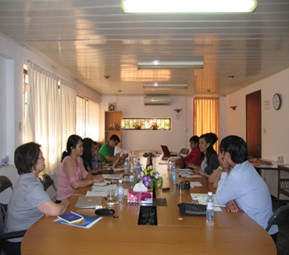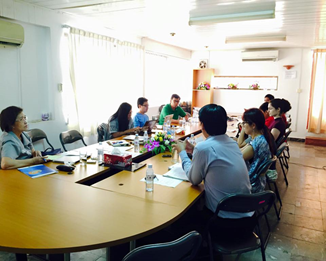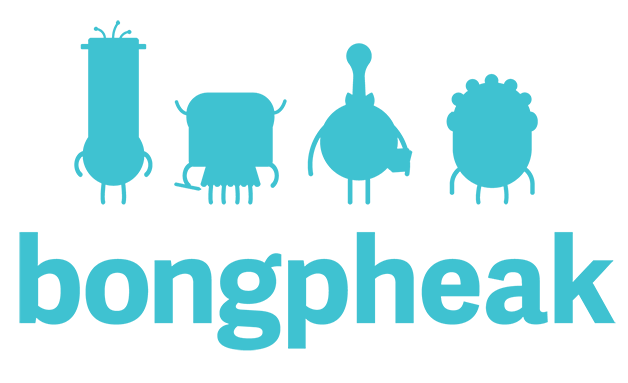 Cambodian
Cambodian English
English
A New Horizon for the ICT4D Cambodia Network Arises with a Strategy Plan
 Representative of partner institutions (ODC, InSTEDD, WMC, CCC, and CCHR) during initiative discussion on the development of strategy plan Date: May 7th, 2015. Photo by the Open InstituteOpen Institute : ix member organizations of the ICT4D Cambodia Network project assembled to devise a course of action for the network on the 7th of May 2015. Working from the premise that knowledge has little value when confined within individuals, but has transformative power when harnessed by whole communities, the six partner organizations gathered together to exchange ideas, identify needs and collectively formulate development objectives for an ICT4D Cambodia Network strategic plan.
Representative of partner institutions (ODC, InSTEDD, WMC, CCC, and CCHR) during initiative discussion on the development of strategy plan Date: May 7th, 2015. Photo by the Open InstituteOpen Institute : ix member organizations of the ICT4D Cambodia Network project assembled to devise a course of action for the network on the 7th of May 2015. Working from the premise that knowledge has little value when confined within individuals, but has transformative power when harnessed by whole communities, the six partner organizations gathered together to exchange ideas, identify needs and collectively formulate development objectives for an ICT4D Cambodia Network strategic plan.
Before work could commence, articulating a strategy plan for the network was imperative. A three to five year guidance plan, it will be subject to yearly reviews. It is an action proposal that states the common goals of all the parties involved, and sets forth the approaches to be implemented to build the network. It allows the partner organizations to have a standard upon which the success of the network in addressing the social needs of the Cambodian citizenry can be measured.
The ICT4D Cambodia Network member institutions identified transparency and access to information as their top priority, and accordingly, they conveyed grave concern about national human rights protections and online security. They agreed that people should be taught about protecting themselves online, about the rights and laws securing them, and also about how to use the Internet more effectively for maximum benefit. Educating civil society organizations (CSOs) on working at the NGO level to make information available (including information related to service providers, was also addressed.
The partners kept in mind the challenges related to accessing information, such as connectivity problems and Internet access (especially for women and for those living in rural areas), both of which are related to bridging the digital gap between the developed and the developing worlds. The conversation naturally led to inquiries about the role of the network in social development, and the changes the partners are hoping to shepherd into Cambodian society in the next three or five years through the network. Questions of how to work with the government, how to approach communities, how to inform citizens and empower them to make wise decisions for their communities, along with questions about the role of development partners, of the private sector, of service providers, and of civil society itself were all raised for dialogue as well.
During the meeting, the ICT4D Cambodia Network partner organizations found that externally, Cambodia is vulnerable to the attacks of more powerful countries in terms of online security. Furthermore, Cambodia struggles internally with freedom of expression, for even while guaranteed by the Constitution, it remains quite limited. On a more positive note, there is a growing ICT community in Cambodia. Cambodia’s youth perceives technology as an exciting new apparatus for business, entrepreneurship, networking and community building as well as an opportune space for participation in civil society organizations. ICTs like Facebook, mobile technology, and Interactive Voice System (IVR) are affording ICT activists and CSOs opportunities to share information and ideas. However, what are needed now are online security measures and cybercrime law development that will protect their privacy and anonymity from police and government officials trying to suppress dissent.
 The whole pictured discussion on ICT issues, grave concern about national human rights, protections and online security. Date: May 7th, 2015. Photo by the Open Institute
The whole pictured discussion on ICT issues, grave concern about national human rights, protections and online security. Date: May 7th, 2015. Photo by the Open Institute
Besides the aforementioned ICT issues of privacy, anonymity, online safety and security for activists and cybercrime law reform, ICT4D partners recognized education, human rights and ICT awareness as emerging issues that could be solved by developing the ICT network. There is a need to devise ways of increasing Internet usage and access to make the ICT4D project better successful and encouraging the use of smartphones, mobile devices, etc. is thought to the best way. The most alarming issue by far, however, is the disparity between women’s access to information in comparison to men. Women have far less access to information as compared to men and the enrolment of women in the ICT sector remains exceptionally low. While the strategy accounts for both women and men, it is also supporting gender sensitivity. All the partners are in complete agreement that because this issue disproportionately disadvantages women, it is a human rights issue that will require special care to empower women with the ultimate goal of gender equality.
One essential topic also discussed in the meeting encompassed observing ICT (Information and Communication Technology) work in over various countries. Among the countries observed, Pakistan stands out for providing no Internet access to the people and for posing great danger to citizens wishing to express dissenting ideas. Australia, conversely, offers free Internet access to all citizens, although freedom of speech is not a protected constitutional right. Sweden, being the first country to have access to information about public services, bio of MPs, national budget and expenses, etc. through the Internet, supports a culture of transparency. In a 2012 Swedish Internet forum, Internet users actually preferred free speech/expression over cyber law.
Korea is also advanced in ICT and has high numbers of Internet users. At 11th Informal Asia-Europe Meeting (SEM)-seminar Internet and Human rights in Seoul in 2011, the emerging issue of internet access as a human right was opened for dialogue. India’s best practice included the eNGO project implemented by Digital Empowerment Foundation (DEF) and funded by Public Interest Registry (PIR) in the US. Open Institute also conducted the project in Cambodia, which consisted of providing more than 50 grassroots NGOs, a web site free of charge, and one year free domain name and hosting. Recurring Internet governance concerns in the meeting and in ICT communities include cyber law, online security, privacy, etc.
On the table for the next meeting is the issue of documentation. ICT4D partners recognized a need for an archive of the work being achieved along with an archive of the combined efforts of various organizations. They spoke about identifying resources and contributions made by all the partners and about assessing the strategy by comparing it to the current situation in Cambodia. For the long term, the partners felt that having an idea of the big picture or framework for the project that will be woven of smaller projects working together is imperative. They also expressed concern about the sustainability of the project, proposing the development of something that generates income in the case that sponsored funding is not available in the future.
In attendance at this second ICT4D meeting were Open Development for Cambodia (ODC), Women Media Cambodia (WMC), InSTEDD/iLab Southeast Asia (InSTEDD), Cambodia Center for Human Rights (CCHR) and The Cooperation Committee for Cambodia (CCC) and Open Institute (OI).
Category:
- Log in to post comments





